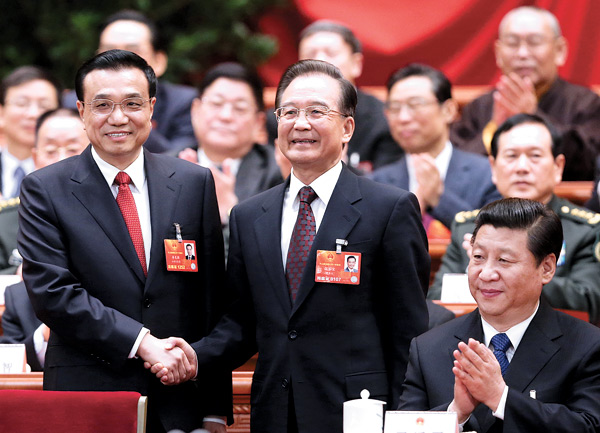Li takes the baton
Updated: 2013-03-16 01:50
By Zhu Zhe in Beijing and Chen Weihua in Washington (China Daily)
|
||||||||
|
 Premier Li Keqiang is congratulated by his predecessor Wen Jiabao after his election, while President Xi Jinping applauds at the fifth plenary meeting of the first session of the 12th National People’s Congress on Friday in Beijing. [Wu Zhiyi / China Daily] |
The nomination of Premier Li Keqiang was approved by nearly 3,000 deputies to the National People's Congress in Beijing on Friday. It is widely expected that Li and newly elected President Xi Jinping can inject fresh momentum into the country's development, despite a host of challenges ahead. Li, born in July 1955, became the seventh premier since the People's Republic of China was founded in 1949, replacing Wen Jiabao, who had headed the State Council since 2003.
When the result of the vote was announced, Li stood up and bowed to all the deputies, smiling. He then shook hands with Xi — who was elected president the previous day — in a handshake marking the establishment of a new top leadership.
Li then shook hands with his predecessor Wen, symbolizing the transfer of power and the heavy duty placed on his shoulders.
Wang Junjin, an NPC deputy from Shanghai and president of JuneYao Group, said, "We have big aspirations for the new premier and hope he can carry the reform forward."
China has become the world's second-largest economy but still faces tough tasks, including maintaining a steady economy, curbing corruption and further improving people's livelihood, Wang said.
"Reforms in key areas should be pushed forward," he said.
Li is known for calling reform "the biggest dividend for China". Since being re-elected in November as a top Party leader, Li has facilitated reforms and showed toughness in advancing complex changes.
"Reform is like rowing upstream. Failing to advance means falling back," he said at a symposium on advancing comprehensive reforms.
"Those who refuse to reform may not make mistakes, but they will be blamed for not assuming their historical responsibility."
Zhang Liyong, an NPC deputy and president of Henan Provincial High People's Court, said Li's experience as head of the country's largest agricultural province of Henan and the large industrial province of Liaoning has given him the ability to solve complicated issues and coordinate relations from all sides.
"He's steady and prudent, but also resolute if necessary," Zhang said. "He's also close to the people and keeps an ear to the ground."
Cheng Li, head of research at the Brookings Institution's John L Thornton China Center in the United States, said such a rich experience working in the provinces is a huge advantage for Li. He described the new Chinese premier as someone who can unite and rally people.
The Brookings scholar, an expert on the Chinese leadership, said the two men at the top of China's leadership, Xi and Li, complement each other.
He also noted that Li is the first Chinese premier with a legal background, and his solid education in law and economics equips him with the knowledge a leader needs.
Li earned an undergraduate degree in law at Peking University and later a doctorate in economics from the same school. He speaks English.
"Li also has a good reputation overseas, and many foreign officials, such as John Kerry, have high regard for him," he said, referring to the US secretary of state.
Tatjana Panajotovic-Cvetkovic, acting charge d'affaires of Serbia in China, who was invited to see the voting on Friday, said she hopes the new leadership can carry forward China's existing foreign policy.
"We hope foreign policy can be continuous and not undergo too many changes," she said. "China has developed good relations with many countries in recent years, even with the regions and countries which were maybe less in focus. I can see China is putting more attention to them, such as the Central and East European countries."
Contact the writers at zhuzhe@chinadaily.com.cn and chenweihua@chinadaily.com.cn.
An Baijie, Zhao Yinan and Li Jiabao in Beijing, and Zhang Yuwei in New York contributed to this story.

 Li Na on Time cover, makes influential 100 list
Li Na on Time cover, makes influential 100 list
 FBI releases photos of 2 Boston bombings suspects
FBI releases photos of 2 Boston bombings suspects
 World's wackiest hairstyles
World's wackiest hairstyles
 Sandstorms strike Northwest China
Sandstorms strike Northwest China
 Never-seen photos of Madonna on display
Never-seen photos of Madonna on display
 H7N9 outbreak linked to waterfowl migration
H7N9 outbreak linked to waterfowl migration
 Dozens feared dead in Texas plant blast
Dozens feared dead in Texas plant blast
 Venezuelan court rules out manual votes counting
Venezuelan court rules out manual votes counting
Most Viewed
Editor's Picks

|

|

|

|

|

|
Today's Top News
Boston bombing suspect reported cornered on boat
7.0-magnitude quake hits Sichuan
Cross-talk artist helps to spread the word
'Green' awareness levels drop in Beijing
Palace Museum spruces up
First couple on Time's list of most influential
H7N9 flu transmission studied
Trading channels 'need to broaden'
US Weekly

|

|








